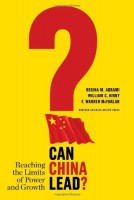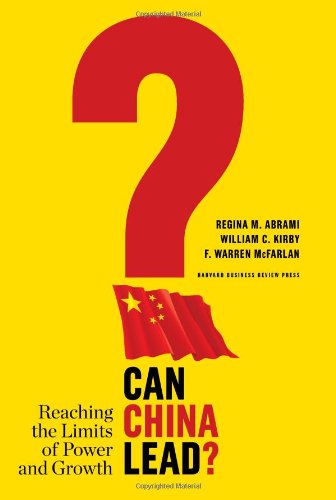 Authors: Regina M. Abrami, William C. Kirby, and F. Warren McFarlan
Authors: Regina M. Abrami, William C. Kirby, and F. Warren McFarlan
Publisher: Harvard Business Press
Book Review by: Sonu Chandiram
We read about, see, and listen to in the mass media, many positive remarks about China, such as its high level of economic growth, its status as a manufacturing colossus, its global leadership position as the world’s largest exporter of goods, its rapid construction of entire cities and the remarkable development of its infrastructure such as bridges, highways and railways; its accumulation of overseas land, cash, gold, silver, other metals, as well as other important commodities. All these have helped raise income levels and standards of living for its people.
The United States led the world for many decades after World War II with fast economic pace and broad-based spread of the fruits of that growth to its people. In recent years the U.S. economy has been in recession, and only recently has it had small (less than one to five percent) spurts of growth. But with high inflation due to printing of trillions of dollars, those spurts of growth have hardly translated into real (after-inflation) income growth.
It is unlikely that the United States will retain for long its position as the world’s largest economy. Nor is it likely that it will regain its lead in increasing its Gross Domestic Product. The world is now looking at the BRICS (Brazil, Russia, India, China, and South Africa) to outpace the U.S. The most likely of these five countries to develop the world’s largest economy is China.
The authors of this book point out that China has had an incredible average annual growth rate of nearly 10 percent for more than thirty years. But the general public does not know much about China’s pains, such as:
- A lack of accountability, transparency and ease of operating in China
- Growing evidence of high-level corruption
- Political favoritism toward state-owned corporations
- Lack of intellectual property protection
These and other problems disrupt innovation, research, and development in China, contend Abrami, Kirby and McFarlan. They document in a section of this book, numerous cases of Chinese companies facing problems and challenges directly related to the factors cited above, and other related ones.
They provide an overall, realistic (not rosy) look at China in the Introduction, discuss the many aspects of the country’s path of economic growth and obstacles it faces, in five chapters, present macroeconomic data in the first appendix, and in a second appendix, cases of real-life problems that thirty companies face.
Introduction: Recasting China’s Economic Miracle
- The Myths and Making of Modern China
- Party, Inc.
- The Engineering State
- Planning Innovation?
- Achieving Commercial Success in China
- Global China
- China 2034
Appendix A: Selected Macroeconomic Data on China
Appendix B: Cases Referenced in Can China Lead?
The authors discuss how political power is exercised at different levels of government and how business and economic decisions are arrived at. They point to the strong influences of the Chinese Communist Party (CCP) and members of government bodies in these decisions.
They contend that not much has changed in the way the CCP runs China and the problems (the four bullet points above, and others) persist. Can these problems probably derail economic growth and curtail its current lead over other countries?
In other words, can China lead? The authors’ answer is No. Get the book to read the authors’ detailed reasons for thinking so.
Authors:
Regina M. Abrami is a Senior Fellow at the Wharton School (University of Pennsylvania), Director of the Global Program at the Lauder Institute of Management and International Studies, and Senior Lecturer in the Department of Political Science. Prior to this, she was a member of the Harvard Business School faculty for eleven years and chair of its inaugural international immersion program.
William C. Kirby is the Spangler Family Professor of Business Administration at Harvard Business School and the T. M. Chang Professor of China Studies at Harvard University. He is Chairman of the Harvard China Fund. He has served as Director of the Fairbank Center for Chinese Studies and Dean of the Faculty of Arts and Sciences at Harvard.
He is an honorary professor at Peking University, Nanjing University, Chongqing University, Zhejian University, East China Normal University, Fudan University, the Shanghai Academy of Social Sciences, and National Chengchi University.
F. Warren McFarlan is a Baker Foundation Professor at Harvard Business School, as well as the Albert H. Gordon Professor of Business Administration, Emeritus. He is concurrently a guest professor at Tsinghua University’s School of Economics and Management and codirector of the school’s China Business Case Center.







